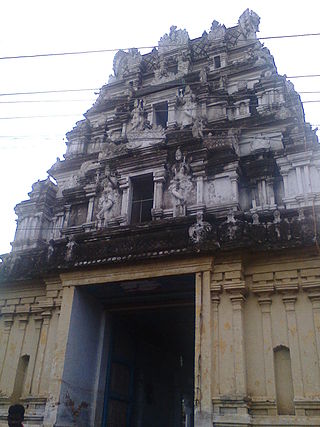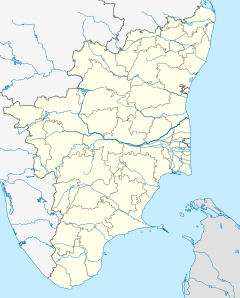
Thiruvaiyaru is a panchayat town in Thanjavur District in the Indian state of Tamil Nadu.

Aravakurichi is a panchayat town and a Taluk headquarters in Karur district in the state of Tamil Nadu, India. Aravakurichi is well known in Tamil Nadu as a major market for Moringa oleifera vegetable. Aravakurichi is the headquarters of Aravakurichi taluk which consists of 40 revenue Villages.
Thiruvidaimarudur is a panchayat town in Thanjavur district, in the Indian state of Tamil Nadu. The town is notable for its Mahalingeshwarar Temple, a Hindu shrine for Lord Shiva.
Budalur is a village located in Thanjavur district of Tamil Nadu. There is a famous historic Shiva temple known as the Abathsagayeshwarar Temple situated in Budalur, built by Great Emperor Raja Raja Cholan during 10th century. This place is easy to access from, Thanjavur by 20 kilometers and Tiruchirapalli by 34 kilometers with both Railways and roadways.

Swetharanyeswarar Temple is a Hindu temple dedicated to the deity Shiva, located in Thiruvenkadu, a village in Mayiladuthurai district in the South Indian state of Tamil Nadu. Shiva is worshiped as Swetharanyeswarar, and is represented by the lingam. His consort Parvati is depicted as Brahmavidyambigai. The presiding deity is revered in the 7th-century-CE Tamil Saiva canonical work, the Tevaram, written by Tamil saint poets known as the Nayanars and classified as Paadal Petra Sthalam. It is significant to the Hindu sect of Saivism as one of the temples associated with the nine planet elements, the Navagraha Stalas, and specifically Budha.

Apatsahayesvarar Temple, Alangudi or Guru Sthalam or Tiru Irum Poolai is a Hindu temple dedicated to Shiva located in the Needamangalam Town near village of Alangudi in the Valangaiman taluk of Tiruvarur district, Tamil Nadu, India. Shiva is worshipped as Apathsahyesvarar, and is represented by the lingam. His consort Parvati is depicted as Elavarkuzhali. The presiding deity is revered in the 7th-century Tamil Saiva canonical work, the Tevaram, written by Tamil saint poets known as the Nayanmars and classified as Paadal Petra Sthalam.

Kandeeswarar Temple is a Hindu temple dedicated to the god Shiva located in Kandiyur also known as Thirukkandiyur or Tirukkandiyur, near Tiruvaiyaru, Tamil Nadu, India. Shiva is worshiped as Kandeeswarar, and is represented by the lingam and his consort Parvati is depicted as Mangalanayagi. The presiding deity is revered in the 7th century Tamil Saiva canonical work, the Tevaram, written by Tamil poet saints known as the nayanars and classified as Paadal Petra Sthalam. As per legends, Shiva is believed to have destroyed eight different demons and the eight Ashta Veeratanam temples are built signifying each of his victories in the war. The temple is one of the eight where Shiva is believed to have removed one of the five heads of Brahma.

Aiyarappar is a Hindu temple dedicated to Shiva located in the village of Tiruvaiyaru, Tamil Nadu, India. Shiva is worshiped as Aiyarappar, and is represented by the lingam and his consort Parvati is depicted as AramValarthaNaayagi. The presiding deity is revered in the 7th century Tamil Saiva canonical work, the Tevaram, written by Tamil poet saints known as the nayanars and classified as Paadal Petra Sthalam.

The Chandiranaar Temple is a Hindu temple in the village of Thingalur, 33 kilometres (21 mi) from Kumbakonam on the Kumbakonam - Thiruvaiyaru road in the South Indian state of Tamil Nadu. The presiding deity is Soma (moon). However, the main idol in the temple is that of Kailasanathar or Shiva. The temple is considered one of the nine Navagraha temples in Tamil Nadu. Thingalur is the birthplace of Appothi Adigal, one of the 63 nayanmars of lord Shiva and an ardent devotee of saint Thirunavukkarasar, though the temple has no assets related to the saint.

Pushpavananathar Temple is a Hindu temple dedicated to Shiva located in the village of Tiruppoonturutti near Tiruvaiyaru, Tamil Nadu, India. Shiva is worshiped as Aiyarappar, and is represented by the lingam and his consort Parvati is depicted as Soundaranayagi. The presiding deity is revered in the 7th century Tamil Saiva canonical work, the Tevaram, written by Tamil poet saints known as the nayanars and classified as Paadal Petra Sthalam.

Odhanavaneswarar Temple, Tiruchotruturai is a Hindu temple dedicated to Shiva located in the village of Tiruchotruthurai, Tamil Nadu, India. The Five Rivers are Vadavaru, Vennaaru, Vettaaru, Kudamuruttiyaaru and Kaaviriyaaru. Shiva is worshiped as Odhanavaneswarar, and is represented by the lingam and his consort Parvati is depicted as Annapoorani. The presiding deity is revered in the 7th century Tamil Saiva canonical work, the Tevaram, written by Tamil poet saints known as the nayanars and classified as Paadal Petra Sthalam.

Vedapuriswarar Temple, Thiruvedhikudi or Vazhaimadunathar Temple is a Hindu temple dedicated to Shiva located in Thiruvedhikudi near Tiruvaiyaru, Tamil Nadu, India. The presiding deity is revered in the 7th century Tamil Saiva canonical work, the Tevaram, written by Tamil poet saints known as the nayanars and classified as Paadal Petra Sthalam. The temple is counted as the earliest of all Chola temples.
Tiruchotruturai is a village in the Thiruvaiyaru taluk of the Thanjavur district in Tamil Nadu, India. The Odhanavaneswarar Temple, a Padal Petra Sthalam dedicated to Shiva, is located here.
Ranganathapuram is a village in the Thiruvaiyaru taluk of Thanjavur district, Tamil Nadu in India. It is located at about 2 km from Agarapettai and about 2 km from Thirukattupalli. The village is famous for the Tiruvaneshwar Temple.

Gauthameswarar Temple is a Hindu temple dedicated to Shiva located at Kumbakonam in Thanjavur district, Tamil Nadu, India.

Kalahasteeswarar Temple is a Hindu temple dedicated to Shiva located at Kumbakonam in Thanjavur district, Tamil Nadu, India.
Kandiyur, also referred to as Thirukkandiyur, is a village in the Thiruvaiyaru taluk of Thanjavur district, Tamil Nadu. Kandiyur is 3.7 km away from the block's headquarters and Thiruvaiyaru, a sacred place. The village is centered around Kandeeswarar temple, after which it is named.

Thanjavur Sankaranarayanar Temple is a Hindu temple located at Thanjavur in the Thanjavur taluk of Thanjavur district in Tamil Nadu, India. The temple is dedicated to Shiva.
Vishnampettai is a large village in Budalur block, Thiruvaiyaru taluk of Thanjavur district, Tamil Nadu. This village is located in the banks of Kaveri River, Kollidam River and Kudamurutti River.

Naducauvery is a village in Thiruvaiyaru Taluk, Thanjavur district, Tamil Nadu, India. Previously, Naducauvery was known as Uthanda Vijayaragapuram. It is located at a distance of 17 km from Thanjavur on the way to Thirukkattupalli.















